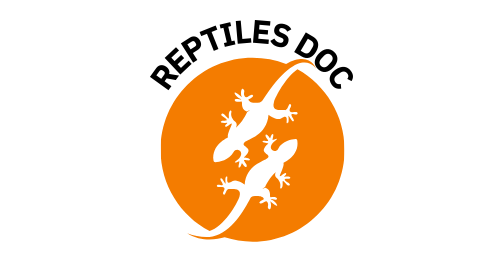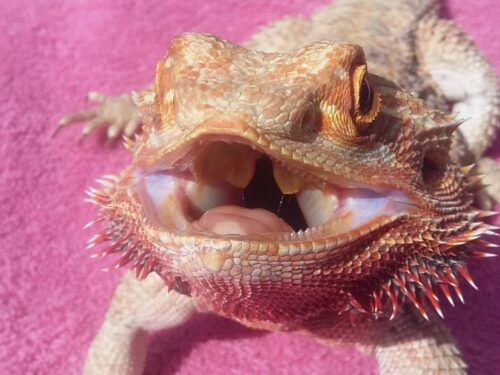Bearded dragons are fascinating reptiles known for their unique personalities and varied diets. As responsible pet owners, ensuring they receive proper nutrition is essential for their health and well-being. Among the many colorful vegetables that can brighten up their meals, bell peppers often catch the eye. But Can Bearded Dragons Eat Bell Peppers?
This question is common among new and seasoned owners alike. In this article, we’ll explore the nutritional benefits of bell peppers, safe feeding practices, and important considerations to help you make the best choices for your scaly companion.
Nutritional Benefits of Bell Peppers
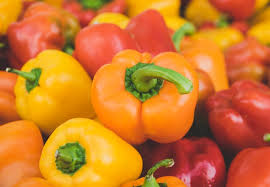
Bell peppers are not only colorful and delicious but also packed with essential nutrients that contribute to overall health. Their vibrant hues signal a wealth of vitamins, minerals, and antioxidants, making them a valuable addition to any diet. Here’s a closer look at the nutritional benefits of bell peppers.
A. Vitamins and Minerals in Bell Peppers
- Vitamins:
- Vitamin A: Supports vision, immune function, and skin health.
- Vitamin C: Boosts the immune system, aids in collagen production, and acts as an antioxidant.
- Vitamin E: Protects cells from oxidative stress and supports skin health.
- Antioxidants and Their Benefits:
- Bell peppers are rich in antioxidants, such as flavonoids and carotenoids, which help combat free radicals in the body. This can reduce inflammation and lower the risk of chronic diseases.
B. Hydration Properties of Bell Peppers
- Bell peppers have a high water content (about 92%), making them an excellent choice for hydration. Eating bell peppers can help maintain fluid balance and support overall health.
C. Fiber Content and Its Importance for Digestion
- Bell peppers are a good source of dietary fiber, which is crucial for healthy digestion. Fiber helps regulate bowel movements, prevents constipation, and supports a healthy gut microbiome. A fiber-rich diet can also aid in weight management by promoting a feeling of fullness.
Incorporating bell peppers into your diet offers numerous health benefits, from essential vitamins and antioxidants to hydration and digestive support. Their diverse nutrient profile makes them a nutritious choice for enhancing meals while promoting overall well-being.
Safe Feeding Practices
When incorporating bell peppers into a bearded dragon’s diet, it’s essential to follow safe feeding practices to ensure their health and well-being. Here’s a guide to preparing and serving bell peppers to your pet.
A. Preparing Bell Peppers for Bearded Dragons
- Washing: Thoroughly wash bell peppers under running water to remove any pesticides or dirt. This step is crucial for ensuring the safety of your bearded dragon.
- Cutting: Slice the bell peppers into small, manageable pieces. This makes it easier for your bearded dragon to eat and digest. Aim for pieces that are about the size of their head.
B. Introducing Bell Peppers into Their Diet
- How Much to Offer: Start with small amounts, such as a few pieces, to gauge your bearded dragon’s interest. Generally, treats should make up about 10-15% of their overall diet.
- Frequency: Offer bell peppers 2-3 times a week, alongside other vegetables and leafy greens, to provide variety and balance in their diet.
C. Monitoring for Allergies or Reactions
- Observation: After introducing bell peppers, closely observe your bearded dragon for any signs of allergies or adverse reactions, such as changes in appetite, behavior, or digestive issues.
- Adjustment: If you notice any negative reactions, discontinue feeding bell peppers and consult a veterinarian if symptoms persist.
By following these safe feeding practices, you can confidently add bell peppers to your bearded dragon’s diet, promoting their health and enjoyment.
Recommended Post: Types of Ball Pythons Explained
Potential Risks and Considerations
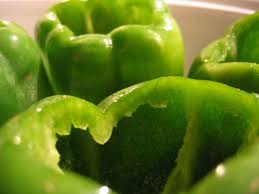
While bell peppers can be a healthy treat for bearded dragons, it’s important to be mindful of potential risks and consider individual differences when feeding them.
A. Overfeeding Vegetables
- Importance of a Varied Diet: Overfeeding vegetables, including bell peppers, can lead to nutritional imbalances. Bearded dragons require a balanced diet that includes insects (for protein) and other vegetables and greens. Bell peppers should only be a part of their overall vegetable intake to ensure they receive all the essential nutrients they need.
B. Signs of Digestive Issues or Discomfort
- Observation: Watch for signs of digestive discomfort, such as bloating, lethargy, or changes in bowel movements after feeding bell peppers. These may indicate difficulty digesting the vegetable or an upset stomach. If such signs persist, it’s best to adjust the diet and consult a veterinarian.
C. Differences in Individual Dragon Preferences
- Personal Preferences: Like humans, bearded dragons have individual tastes. Some may enjoy bell peppers, while others may refuse to eat them. If your dragon doesn’t seem interested, try mixing the peppers with other preferred foods or offering different vegetables to keep meals enjoyable.
By keeping these considerations in mind, you can minimize risks and cater to your bearded dragon’s unique dietary needs.
Alternative Vegetables and Treats
In addition to bell peppers, bearded dragons can enjoy a variety of other safe vegetables and fruits. A diverse diet is essential for their health and well-being.
A. Other Safe Vegetables for Bearded Dragons
- Leafy Greens: Collard greens, kale, dandelion greens, and mustard greens are excellent sources of vitamins and minerals.
- Squash: Zucchini and yellow squash are nutritious and easy for bearded dragons to digest.
- Carrots: Shredded or finely chopped carrots provide vitamin A and can be offered in moderation.
- Cucumbers: High in water content, cucumbers can help with hydration but should be given in small amounts due to lower nutritional value.
B. Fruits and Their Role in the Diet
- Safe Fruits: Fruits like strawberries, blueberries, mango, and papaya can be given as occasional treats. They are high in vitamins and can add variety to the diet.
- Moderation is Key: Due to their higher sugar content, fruits should be offered sparingly, about once a week or as a special treat.
C. The Importance of Diversity in Diet
- Nutritional Balance: A varied diet ensures that bearded dragons receive a wide range of nutrients necessary for their health, growth, and vitality.
- Prevention of Boredom: Mixing different vegetables and fruits can keep mealtime interesting for your pet, encouraging healthy eating habits and reducing the likelihood of picky eating.
Incorporating a variety of safe vegetables and occasional fruits into your bearded dragon’s diet promotes overall health and well-being, making mealtime enjoyable for them.
What Color Bell Pepper Can Bearded Dragons Eat
Bearded dragons can safely eat bell peppers of all colors, each offering unique flavors and nutritional benefits. Here’s a detailed look at the different types of bell peppers and their suitability for bearded dragons:
1. Green Bell Peppers
- Taste: Green bell peppers have a slightly bitter taste compared to their ripe counterparts.
- Nutritional Value: They contain a good amount of vitamin C and some vitamin A, but less than red, yellow, and orange peppers. Green peppers also provide dietary fiber and antioxidants.
- Feeding Considerations: While green peppers are safe, it’s best to introduce them in moderation, especially if your bearded dragon is not used to the taste.
2. Red Bell Peppers
- Taste: Red bell peppers are the sweetest of all bell peppers. This sweetness makes them appealing to many bearded dragons.
- Nutritional Value: They are exceptionally high in vitamins A and C, which are crucial for immune function and overall health. Red peppers also contain antioxidants like lycopene and beta-carotene, promoting skin health and reducing inflammation.
- Feeding Considerations: Red peppers can be offered more frequently due to their high nutritional content. They can be a great addition to salads or served as a standalone treat.
3. Yellow Bell Peppers
- Taste: Yellow bell peppers have a mild, sweet flavor, similar to red peppers but slightly less sweet.
- Nutritional Value: They are rich in vitamins A and C and provide a good balance of nutrients, including folate and potassium.
- Feeding Considerations: Yellow peppers are a healthy option and can be included in your bearded dragon’s diet alongside other vegetables and fruits.
4. Orange Bell Peppers
- Taste: Orange bell peppers are also sweet, making them enjoyable for bearded dragons.
- Nutritional Value: They offer a similar nutrient profile to yellow and red peppers, providing significant amounts of vitamins A and C, as well as other essential nutrients.
- Feeding Considerations: Orange peppers can be fed in moderation as part of a varied diet, offering both taste and nutrition.
Nutritional Benefits Across Colors
- Vitamins and Minerals: All bell peppers are good sources of vitamins A and C, which support vision, immune function, and skin health. They also contain minerals like potassium and magnesium, essential for various bodily functions.
- Antioxidants: Bell peppers are rich in antioxidants that help combat oxidative stress in the body, potentially reducing inflammation and the risk of chronic diseases.
- Hydration: Bell peppers have a high water content (about 92%), which aids in hydration, especially in bearded dragons that may not drink water regularly.
Preparation and Serving
- Preparation: Always wash bell peppers thoroughly to remove pesticides and contaminants. Cut them into small, manageable pieces to prevent choking and make it easier for your bearded dragon to eat.
- Serving Frequency: Offer bell peppers a few times a week, alternating with other vegetables and greens to ensure a balanced diet. Monitor your bearded dragon’s response to different colors and adjust offerings based on their preferences.
Bearded dragons can eat all colors of bell peppers. Each color brings unique flavors and nutritional benefits, making them a valuable addition to a varied diet. By incorporating a mix of green, red, yellow, and orange bell peppers, you can enhance your pet’s meals while supporting their overall health. Always observe your bearded dragon for any signs of preference or potential digestive issues when introducing new foods.
What Food Do Beardies Love
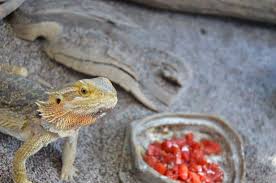
Bearded dragons have varied tastes and enjoy a wide range of foods. Here’s a list of foods that many bearded dragons love, along with some tips for offering them:
Foods Bearded Dragons Love
- Insects:
- Crickets: High in protein and a staple food.
- Mealworms: Enjoyable but feed in moderation due to high fat.
- Dubia Roaches: Nutritious and easy to digest.
- Waxworms: Treats, high in fat, offer occasionally.
- Vegetables:
- Leafy Greens: Collard greens, kale, and dandelion greens are favorites.
- Bell Peppers: Sweet and crunchy; available in various colors.
- Squash: Zucchini and butternut squash are popular choices.
- Fruits:
- Berries: Strawberries, blueberries, and raspberries make great treats.
- Mango: Sweet and enjoyable; feed in moderation.
- Papaya: Tasty and good for digestion.
- Commercial Diets:
- Pellets: High-quality commercial pellets can be a balanced option.
- Freeze-Dried Insects: Convenient and well accepted.
- Occasional Treats:
- Cooked Eggs: Scrambled or boiled as an occasional protein boost.
Tips
- Variety: Offer a diverse diet to keep meals interesting.
- Monitor Preferences: Adjust based on your bearded dragon’s likes.
- Hydration: Provide fresh water and hydrating foods like cucumbers.
- Supplementation: Consider calcium and vitamin D3 as needed.
This balanced approach ensures your bearded dragon stays healthy and happy!
Conclusion
Bell peppers can be a nutritious addition to a bearded dragon’s diet, offering essential vitamins and hydration. However, it’s important to introduce them gradually and ensure a balanced diet with a variety of foods. So, Can Bearded Dragons Eat Bell Peppers? Yes, they can, but moderation and proper preparation are key to keeping your pet healthy and happy.
